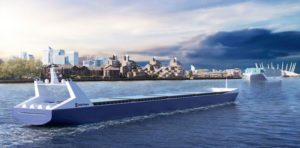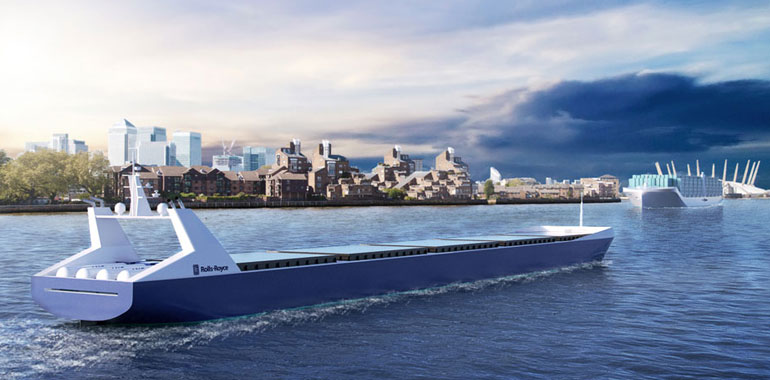
At the behest of Professional Mariner and many other interested parties within and outside of the maritime industry, I’ve been asking many questions about maritime autonomous surface ships (MASS) relating to safety, security and future maritime careers. I have sought answers from the International Maritime Organization (IMO), the U.S. Coast Guard, the U.S. Maritime Administration (MarAd) and sources in the private sector. I have only been moderately successful due to the simple fact that the above named agencies and others don’t have a lot of answers to give.
In fairness to most of them, I must say that they are at least seeking many of the same answers that I am. Many of them are currently running their own MASS studies or are participating in others, some of which include MASS test zones known as marine autonomy research sites (MARS). I did manage to get some answers at the last Ship Operations Cooperative Program (SOCP) webinar, at which I have been a panel speaker several times in the past. The guest speaker at the Sept. 17 session was Lt. Matthew Meacham of the Coast Guard’s Office of Design and Engineering Standards, who identified a MARS zone on Michigan’s Keweenaw Peninsula in Lake Superior that is of great interest to the service.
Development of this particular zone originated at Michigan Technological University. The school operates the Great Lakes Research Center, which is a member of the Smart Ships Coalition. The coalition consists of academic institutions, state and federal agencies, international organizations and private-sector entities that wish to study and promote marine autonomous technologies. The MARS zone created at the school is said to enjoy the benefits of highly accurate GPS data to aid in the collection of MASS information.
Meacham seemed pro-MARS and pro-MASS from the start. He began his lecture by stating that the Coast Guard regulatory process regarding autonomous systems and the reduction of required crew began as early as 1969. He also pointed out that there have been several crew reduction iterations since that time, mostly related to engineering spaces and watches. He used those examples as precedents for future bridge watch reductions relating to MASS. I must say that he is not the only one in the Coast Guard who has expressed that “precedents” attitude in public as well as directly to me in private. You see, I have been asking many different Coast Guard personnel many MASS questions over the years. The most recent SOCP webinar was not an exception.
At the end of his lecture, I asked Meacham if he knew of any autonomous vessel designs that would take into account the accommodation of local pilots. This is just one of many areas of MASS that is currently being studied within the IMO. Meacham said he was not aware of any such design requirements, because frankly there are none at this time. The IMO will tackle that issue through its Maritime Safety Committee only after the agency’s MASS scoping study has been completed. It wasn’t as much of a trick question as it was an inquiry to see if the Coast Guard was planning to retain onboard pilots within U.S. waters.
That question fit right into another question that was asked of Meacham about the maiden voyage of the 53-foot MASS vessel Mayflower, which is scheduled to cross the Atlantic Ocean from Plymouth, England to Plymouth, Mass., in the spring of 2021. The marine research vessel was launched on Sept. 15 and will undergo about six months of sea trials prior to its Atlantic transit. Meacham had no specifics on how or if a pilot would be accommodated on board, but he did reassure the SOCP webinar participants that the Coast Guard would be involved upon Mayflower’s arrival in U.S. waters.
To the lieutenant’s credit, even though he did not have a lot of specific answers to the questions asked, he did ask for more questions and suggestions regarding commercial MASS. He recognized the value of the opinions of professional mariners throughout the industry. He asked several times for more comments to be directed to the Coast Guard via the Federal Register. Unfortunately, the request for information (RFI) period regarding commercial MASS ended on Oct. 13. Before the RFI shutoff date, I submitted my own suggestions to the Coast Guard. I know that not all readers will agree with all of my submission points, but protecting future professional mariner careers is important to me. I felt that it was my duty to make an immediate submission regarding commercial MASS that included healthy doses of logic and common sense.
As I stated to the Coast Guard, at the very least I would like to see a skeleton crew on board large commercial autonomous vessels in order to maintain a minimum level of safety and security, and to ensure some future U.S. maritime careers. This also would aid in compliance with current harbor pilot requirements and the smooth transition of those pilots. I don’t know how many of my comment points Meacham agrees with, however I did notice that we both agree that some vessels should not have any crew on board when engaged in inherently dangerous activities.
So, common sense is alive and well within the Coast Guard, but the real question still remains: Is the service going to capitulate to vessel owners who demand absolutely no crew on board large commercial autonomous ships that might pose a threat to the public and our environment? I also would like to know if we will have to wait for a disaster to occur to realize that zero-crew regulations for large commercial MASS is a mistake. We should educate our policymakers and lawmakers now about the importance of having a skeleton crew on board before something bad happens.
Minimum commercial MASS crew requirements should be implemented into the Convention on the International Regulations for Preventing Collisions at Sea (COLREGS) with the full endorsement of the United States. Proactive prevention of all vessel disasters is the guiding spirit of COLREGS. Vessel owners and maritime insurance companies might see one or two vessel disasters as acceptable losses, but I don’t see it that way. Just because MASS financial loss and liability might be restricted to the value of the vessel and its cargo doesn’t lessen the potential loss of other property, environmental damage caused or the possible loss of life. The public would agree with me if they knew what might be coming.
The public might be the last to know about zero-crew regulations for large commercial MASS, but after a casualty inevitably happens, they will soon become informed and then rightfully outraged. The public tends to go directly to the top after something drastic like that occurs. The intensity of the public backlash will be equal to the scope of the maritime incident multiplied by the realization that there was a zero-crew policy in place. There won’t be a desk tall enough or wide enough to hide behind for even the most senior leadership. Many such policymakers who may have become accustomed to enjoying the benefits of secure government employment might be quite surprised when they experience the reverse. The public won’t soon let go either, and it will let everyone in power know exactly how it feels.
I let the Coast Guard know exactly how I feel about commercial MASS and so should you. You should either reinforce my official submission in the Federal Register (www.federalregister.gov, docket number USCG-2019-0698) or make a comment of your own directly to the U.S. representative of the IMO Maritime Safety Committee, regardless of the RFI deadline. The IMO scoping study is ongoing and your comments should be as well. There is still time for the Coast Guard, MarAd and the IMO to hear from professional mariners. I strongly suggest that you give them your polite and reasonable opinions regarding large commercial MASS while you still have a maritime job on which to comment. The leader of the U.S. delegation to the Maritime Safety Committee is Rear Adm. John Nadeau, assistant commandant for prevention policy for the Coast Guard, who is also commander of the service’s 8th District. His phone number there is (504) 589-6298. •
Capt. Marc Deglinnocenti is a maritime technical writer. His sea time dates to 1974 in a wide variety of roles on sailboats, conventional and tractor tugboats, training ships, barges, warships, cargo ships, passenger vessels and research vessels. He can be reached by emailing oldarmada@gmail.com.

